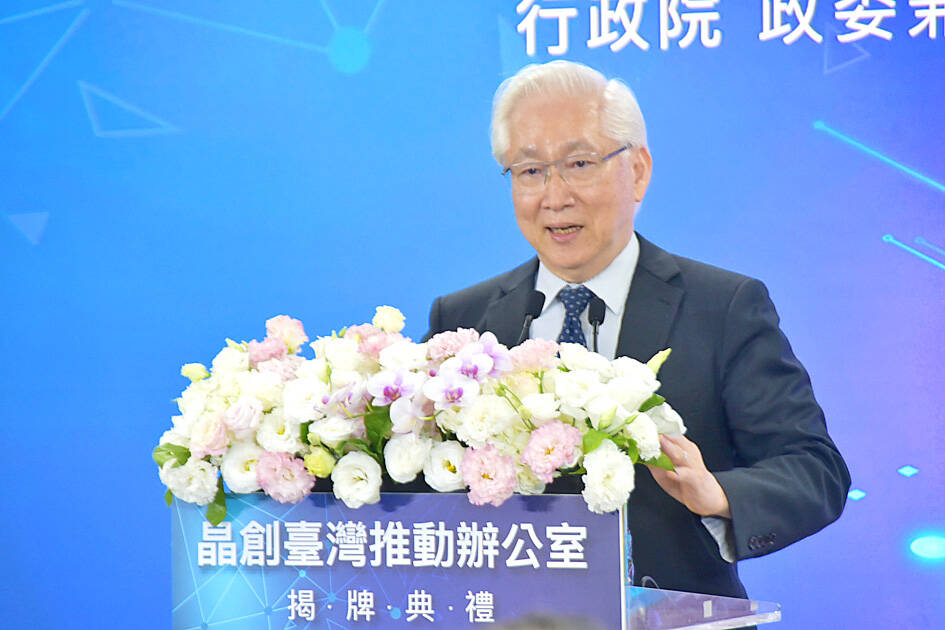Taiwan and Australia yesterday signed a scientific and technological cooperation agreement, the National Science and Technology Council said.
Representative to Australia Douglas Hsu (徐佑典) and Australian Representative in Taiwan Robert Fergusson signed the Science and Technology Arrangement in Canberra after six months of discussions and planning, the council said.
Council Minister Wu Tsung-tsong (吳政忠) proposed the partnership when visiting senior officials at the Australian Department of Industry, Science and Resources (DISR) in October last year, it said.

Photo: Wu Po-hsuan, Taipei Times
The DISR and Australian Department of Foreign Affairs and Trade officials witnessed the signing, while representatives from the council, the Ministry of Foreign Affairs and the Australian Office, Taipei, participated online, the council said.
The agreement consists of 22 research cooperation and talent exchange programs, focusing on four main areas: manufacturing information and communications technology, semiconductor and critical technology supply chain resilience, biotechnology, and the net zero transition, it said.
The arrangement is an upgrade from a memorandum of understanding (MOU) Taipei and Canberra signed in 2012, which demonstrated the importance both parties attach to bilateral cooperation in scientific research, Hsu said.
Under the agreement, the two sides would expand cooperation with the aim of further contributing to international society, he said.
DISR General Manager Richard Samuels said he hoped that the deal would help bolster relations between Taiwan and Australia through concrete actions, the council said.
Australia is the fifth country to sign such an agreement with Taiwan, following the US, Germany, France and Canada, it said.
Taiwan has made concrete progress under the deals, including holding the first Science and Technology Cooperation Dialogue with the US in May last year and a scientific research conference with France last month, the council said.
Taiwan and Germany are cooperating in many fields, such as semiconductors and lithium batteries, it said, adding that the two sides are scheduled to hold high-level talks in Germany later this year to review the outcomes of the arrangement.
Separately, Taiwan and Australia last month signed an MOU on transport safety and information exchanges, the Taipei Economic and Cultural Office in Australia said.
The two sides have long been cooperating on aviation safety, with the Aviation Safety Committee signing a similar MOU with the Australian Bureau of Air Safety Investigation in 1998, Hsu said.
The updated MOU expands the scope of cooperation from civil aviation to include maritime and railway transportation safety, including accident investigation, safety research and technical training, he said.

‘DENIAL DEFENSE’: The US would increase its military presence with uncrewed ships, and submarines, while boosting defense in the Indo-Pacific, a Pete Hegseth memo said The US is reorienting its military strategy to focus primarily on deterring a potential Chinese invasion of Taiwan, a memo signed by US Secretary of Defense Pete Hegseth showed. The memo also called on Taiwan to increase its defense spending. The document, known as the “Interim National Defense Strategic Guidance,” was distributed this month and detailed the national defense plans of US President Donald Trump’s administration, an article in the Washington Post said on Saturday. It outlines how the US can prepare for a potential war with China and defend itself from threats in the “near abroad,” including Greenland and the Panama

A wild live dugong was found in Taiwan for the first time in 88 years, after it was accidentally caught by a fisher’s net on Tuesday in Yilan County’s Fenniaolin (粉鳥林). This is the first sighting of the species in Taiwan since 1937, having already been considered “extinct” in the country and considered as “vulnerable” by the International Union for Conservation of Nature. A fisher surnamed Chen (陳) went to Fenniaolin to collect the fish in his netting, but instead caught a 3m long, 500kg dugong. The fisher released the animal back into the wild, not realizing it was an endangered species at

The High Prosecutors’ Office yesterday withdrew an appeal against the acquittal of a former bank manager 22 years after his death, marking Taiwan’s first instance of prosecutors rendering posthumous justice to a wrongfully convicted defendant. Chu Ching-en (諸慶恩) — formerly a manager at the Taipei branch of BNP Paribas — was in 1999 accused by Weng Mao-chung (翁茂鍾), then-president of Chia Her Industrial Co, of forging a request for a fixed deposit of US$10 million by I-Hwa Industrial Co, a subsidiary of Chia Her, which was used as collateral. Chu was ruled not guilty in the first trial, but was found guilty

DEADLOCK: As the commission is unable to forum a quorum to review license renewal applications, the channel operators are not at fault and can air past their license date The National Communications Commission (NCC) yesterday said that the Public Television Service (PTS) and 36 other television and radio broadcasters could continue airing, despite the commission’s inability to meet a quorum to review their license renewal applications. The licenses of PTS and the other channels are set to expire between this month and June. The National Communications Commission Organization Act (國家通訊傳播委員會組織法) stipulates that the commission must meet the mandated quorum of four to hold a valid meeting. The seven-member commission currently has only three commissioners. “We have informed the channel operators of the progress we have made in reviewing their license renewal applications, and